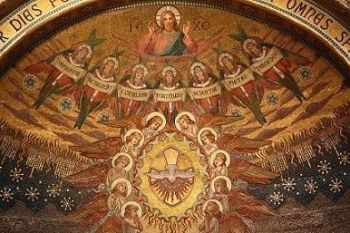My name is surprisingly common. I have a continual search request with Google to tell me whenever my name is in the news; as a result, I get a lot of emails every week about people who have my name. I’m aware of people who are journalists, scientists, athletes, lawyers, politicians, criminals, and much more.
I was reminded of the commonness of my name when I read today’s Gospel selection, which details Jesus’ selection of the Twelve Apostles. Toward the end of that list of names is the following: . . . and Judas the son of James, and Judas Iscariot, who became a traitor.
Nowadays most folks in the English-speaking world think of Judas (the son of James) as St. Jude, patron saint of lost and hopeless causes. However, apparently most versions of the Bible not in English refer to St. Jude and Judas (the betrayer of Christ) as the same person.
I obviously won’t suppose to speak for St. Jude. However, if I were him, I would have made sure everyone knew from the moment they met me that, yes, I was an Apostle of Christ and my name was Judas, but – no – I wasn’t that Judas.
What’s in a name? There is obviously power in names. It was one of the gifts bestowed by the Lord upon Adam in the Garden of Eden (Genesis 2:19-20). We are entrusted with that power when we name our own children, and we reaffirm that power when we choose our confirmation names during the Sacrament of Confirmation, tying ourselves in with a saint we’d like to protect and guide us.
However, names don’t change the underlying nature of the reality which we describe. I was shocked to learn last week that this exotic new food I’d heard about – aubergines – were the English name for what I refer to as the humble eggplant. In a similar way, we can refer to Jesus as the Christ, the Son of Man, the Son of God, our Lord, and many other titles; none of those change the underlying truth of his divinity or humanity.
And regardless of the names we humans have – or who we share our names with – our fundamental selves are the same flawed, imperfect humans who form the basis of the Catholic Church. How can something so glorious and amazing as the Church continue to survive and even thrive when humanity itself is so deeply flawed?
We gain insight into that today with the reading from Ephesians:
. . . you are fellow citizens with the holy ones and members of the household of God, built upon the foundation of the Apostles and prophets, with Christ Jesus himself as the capstone. Through him the whole structure is held together and grows into a temple sacred in the Lord; in him you also are being built together into a dwelling place of God in the Spirit.
Take a moment to let that passage sink in. The foundation – as partially laid out in today’s gospel selection from Luke – is built of flawed humans . . . but Jesus – flawless Jesus – is the capstone. He holds the Church together, and together through him we are made better together than we would be individually.
No, we’re not perfect. The Apostles weren’t perfect; one of the first Twelve chosen even betrayed our Lord. But though we are called to become more perfect, God still works through us, through our faults, our foibles, and our problems to form a Church that strives evermore to do His will on Earth. Jesus turned the betrayal of Judas into part of his larger plan of salvation. If God can do that, He can turn our broken selves into a workable part of the greater whole.
Regardless of the baggage that might be associated with your name, regardless of how imperfect you feel compared to Christ, regardless of your history or past mistakes or former associations, you can be an active participant in God’s goal of global salvation. Jesus chose Twelve Apostles – imperfect as we all are – and from there a glorious Church has grown and prospered, giving glory and honor to God. We are fellow citizens with the holy ones. With Christ as the capstone, we can arise above our mortal failings and the burdens of our pasts, becoming part of God’s great plan for the future.

